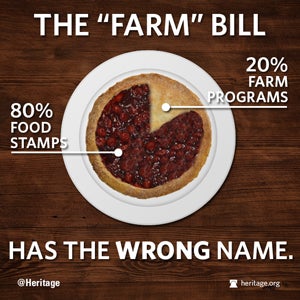Farm Bill Extension Would Be Better Than $1 Trillion Food Stamp/Subsidy Disaster
Daren Bakst /
 Congress doesn’t have much time to work out a food stamp/farm bill this year. If no farm bill is passed, this wouldn’t be the end of the world. Just like it did last year, Congress can pass an extension.
Congress doesn’t have much time to work out a food stamp/farm bill this year. If no farm bill is passed, this wouldn’t be the end of the world. Just like it did last year, Congress can pass an extension.
The House and Senate are trying to work out differences between their two farm bills, but both are weak when it comes to real reforms. They do little on agriculture reform and may even make things worse. The Senate does virtually nothing when it comes to food stamps; the House makes some modest food stamp reform. In the House bill, several programs—including the sugar program, which drives up food prices—wouldn’t expire after five years like most agriculture programs. This means Congress would be locking in bad policy not just for five years but for an indefinite period of time (referred to as “permanent law”).
Both bills would also add new programs that would impose massive liability on taxpayers to protect farmers from virtually all risk. One of these programs would drastically change agriculture policy by trying to protect farmers from even minor losses. The safety net concept would be a thing of the past.
If Senate policies on food stamps are adopted, Congress will have failed to address almost all food stamp reforms. This includes requiring able-bodied food stamp recipients to work or look for work.
When negotiators are working off two bad bills, it’s almost certain that the resulting bill will also be bad. This, combined with the time crunch, likely makes an extension the best option.
Even some powerful agriculture groups—the American Soybean Association, the National Corn Growers Association, and the U.S. Canola Association—sent a letter to Congress supporting an extension if certain subsidy programs contain policies they oppose.
However, an extension is only a procedural step that would let Congress get things right. Working off the same two bad farm bills in the future is simply delaying the same problem that exists now: Both the House and Senate haven’t developed necessary reforms in the first place that can serve as the foundation for a good farm bill.
Critical to achieving this reform is for each chamber to create two separate bills—one on food stamps and one on agriculture policy—so that these programs can be considered on their own merits.
Regardless of whether there’s an extension or a farm bill, there still needs to be real reform. An extension is better than a bad farm bill. Five years of bad policy is far worse than a temporary delay in order to get things right.
